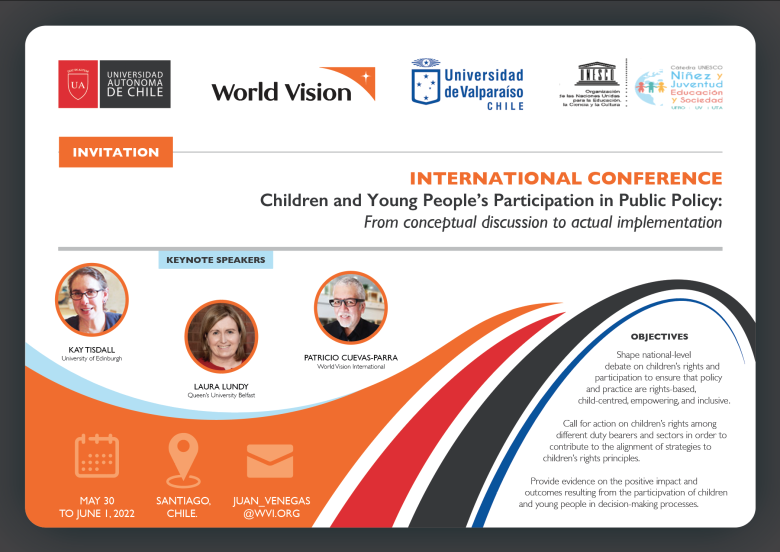
Children and Young People’s Participation in Public Policy: From conceptual discussion to actual implementation
International Conference
May 30 to June 1, 2022.
Santiago, Chile.
As an international human rights treaty, the UN Convention on the Rights of the Child (UNCRC) has provided a clear framework for ensuring the minimum standards relating to the survival, development, protection, non-discrimination, and participation of all children young people.
The Convention changed the way children and young people were viewed and treated to one that recognises them as full human beings with distinct rights instead of being regarded as passive objects in need of protection and aid. The UNCRC has had an enormous impact on the lives of millions of children worldwide as it has recognised civil, cultural, political, economic, and social rights for all. However, the implementation of the UNCRC across countries and regions has been insufficient in bringing about effective policy reform due to a lack of coherent and holistic approaches. Several countries have been unable to comply with obligations under the UNCRC, and its provisions have not been translated into law, policy, strategies, and practice.
UNCRC Article 12 includes the right to express a view and have that view given due weight. The right to express a view freely means that children and young people have the right to express relevant perspectives and experiences to influence decision-making. This right includes a requirement for State Parties to listen to the views of children and young people and facilitate their participation in all matters affecting them within the family, schools, institutions, and judicial procedures. State Parties and decision-makers have an obligation to ensure the implementation of this right by listening to the child's views and finding the best ways for children and young people to express their opinions.
PURPOSE
The conference will bring together government representatives, intergovernmental organisations, civil society, the private sector, academic institutions, and children themselves to discuss the critical role of children and young people in public policy discussion on issues relevant to them. This event will provide essential inputs to the current deliberations at the global and national level on the formulation of a political agenda for children and how children and young people can engage.
OBJECTIVES
- Shape national-level debate on children’s rights and participation to ensure that policy and practice are rights-based, child-centred, empowering, and inclusive.
- Call for action on children’s rights among different duty bearers and sectors in order to contribute to the alignment of strategies to children’s rights principles.
- Provide evidence on the positive impact and outcomes resulting from the participation of children and young people in decision-making processes.
KEYNOTE SPEAKERS
Kay Tisdall is a Professor of Childhood Policy at the University of Edinburgh. Part of Childhood and Youth Studies, she works across policy, research, and teaching on children's human rights. This includes collaborative projects on topics such as family law and domestic abuse, mental health, and children and young people's participation.
Laura Lundy is Co-Director of the Centre for Children’s Rights and Professor of Children’s Rights at Queen’s University Belfast and Professor of Law at University College Cork. She is joint Editor in Chief of the International Journal of Children’s Rights. She is the author of the widely used ‘Lundy Model’ of child participation and has expertise on the implementation of the UNCRC in law and policy.
Patricio Cuevas-Parra is an Honorary Fellow and member of Childhood and Youth Studies at the University of Edinburgh and Director for Child Participation and Rights with World Vision International. His research interests are children's participation in public policy and decision-making, child-led research, methodologies and impact, and child activism.